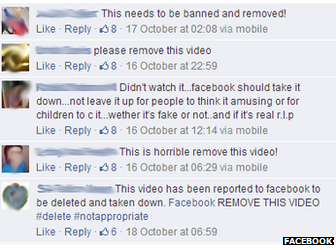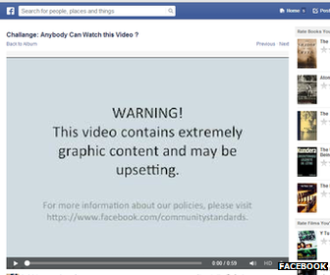Earlier in the week, the BBC revealed that Facebook is now allowing videos of extreme violence to be posted by users, specifically citing a clip that shows a half-naked woman in Mexico being decapitated by a masked man.

According to a company release, the reason for lifting this ban was to allow the site’s users the ability to share and condemn the material.

After a largely negative public response to this story, the social media site announced that in order to avoid having an unwanted still-frame of the video show up in a user’s newsfeed, material of this nature would be accompanied by a warning message that would cover the video’s contents until the user presses play.

Will Gardner, chief executive of Childnet and a UK member of Facebook's Safety Advisory Board, stated that he still had some reservations about the company’s decision despite this added means of protection.
“It's a step forward but it's still horrific content,” he said.
Criticism of the company even stretched so far as Britain’s Prime Minister, David Cameron, who took to Twitter to share his displeasure with Facebook’s decision.

To try and control the company’s rapidly deteriorating public image, Facebook officials pointed out that the site previously allowed videos of this nature to be posted by users, and only put a ban on it this past May.
They went on to further clarify that while content of this nature would now be allowed, clips posted by users glorifying the violence would be blocked.
While on paper this might sound like a legitimate plan moving forward, the decision to allow the video showing the Mexican woman being decapitated remained the epicenter of the controversy, as the site was allowing a video to be shared despite the fact that it goes completely against the company’s ban on images and videos showing a woman’s “fully exposed breast.”
“Facebook has long been a place where people turn to share their experiences, particularly when they're connected to controversial events on the ground, such as human rights abuses, acts of terrorism and other violent events,” a company spokeswoman explained. “People are sharing this video on Facebook to condemn it. If the video were being celebrated, or the actions in it encouraged, our approach would be different.”
Eventually, pressure on the company proved too much and the decision to allow the decapitation video to be shared was reversed; it was promptly removed from the site.
A press release issued by Facebook stated that would still allow some graphic content to be shared, but that its team would take a more comprehensive look at its context moving forward.
“First, when we review content that is reported to us, we will take a more holistic look at the context surrounding a violent image or video, and will remove content that celebrates violence,” it said.
“Second, we will consider whether the person posting the content is sharing it responsibly, such as accompanying the video or image with a warning and sharing it with an age-appropriate audience.
“Based on these enhanced standards, we have re-examined recent reports of graphic content and have concluded that this content improperly and irresponsibly glorifies violence. For this reason, we have removed it.”
Story via: bbc.co.uk
Advertisement
Learn more about Electronic Products Magazine





